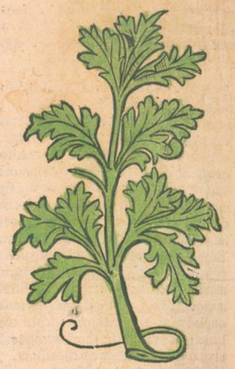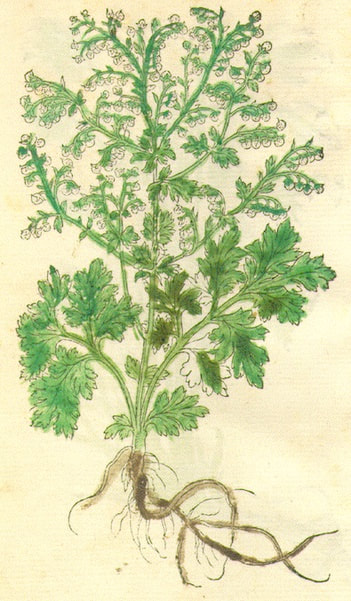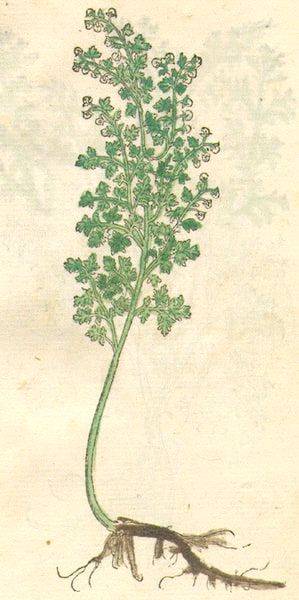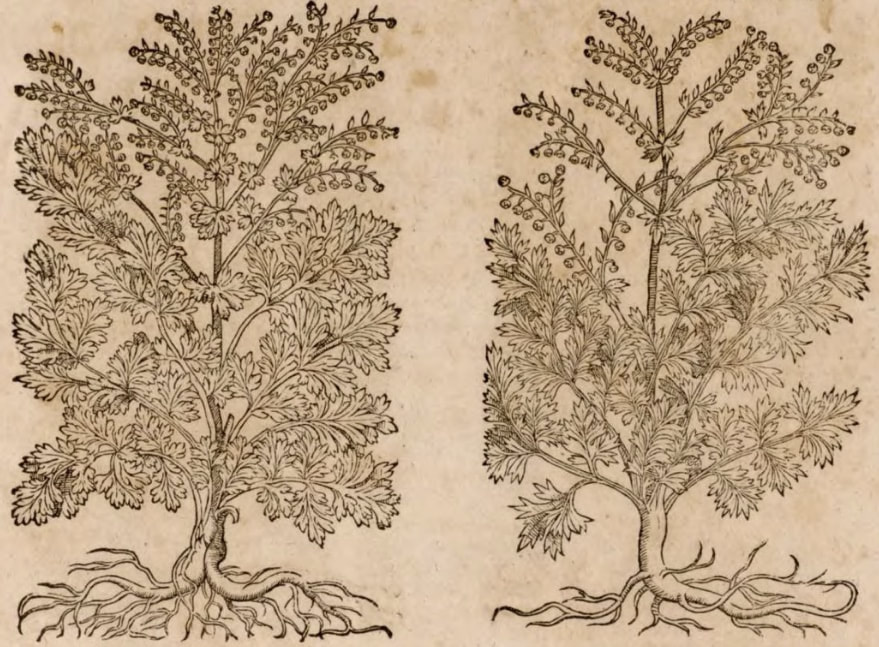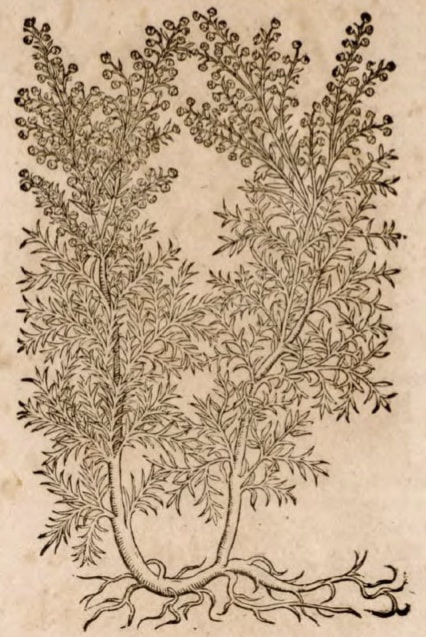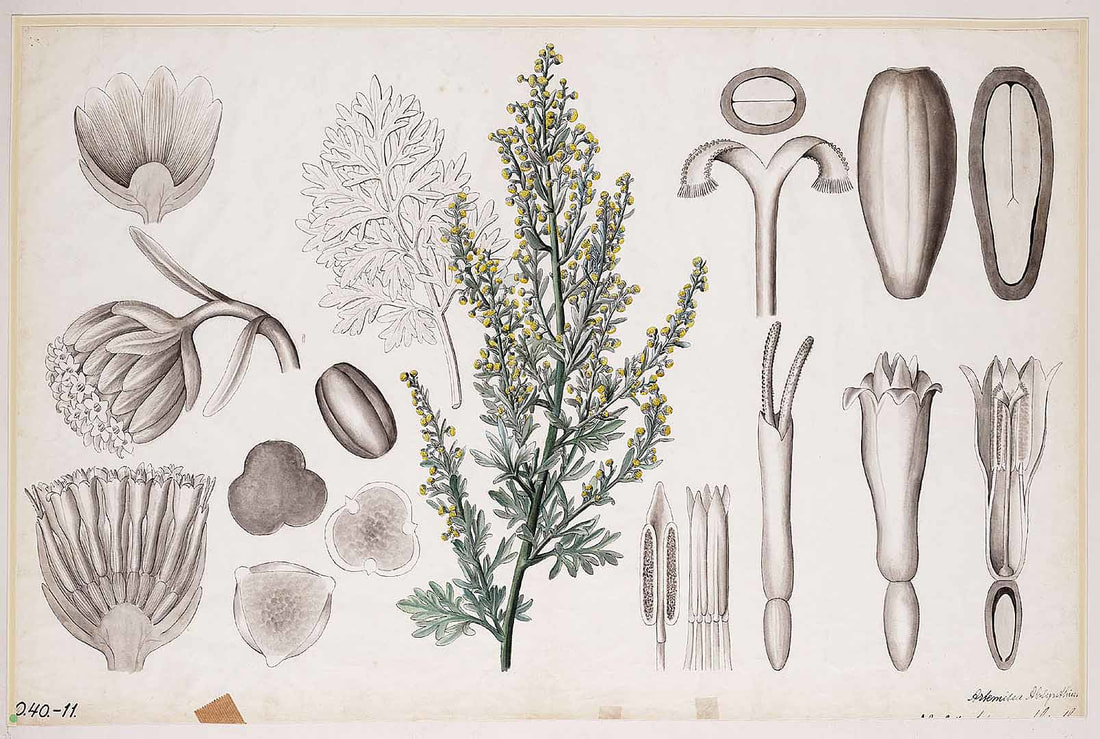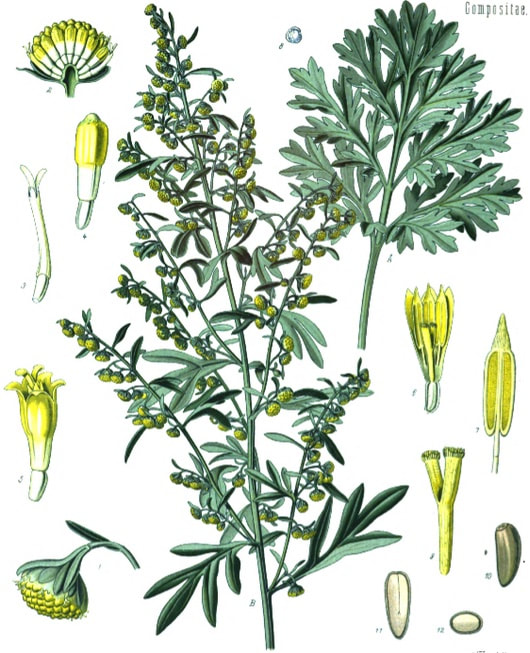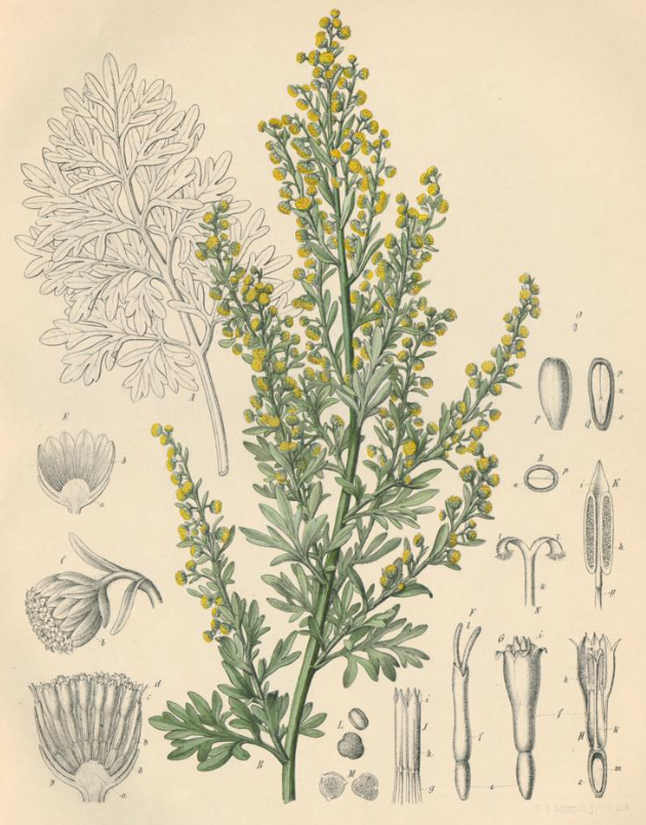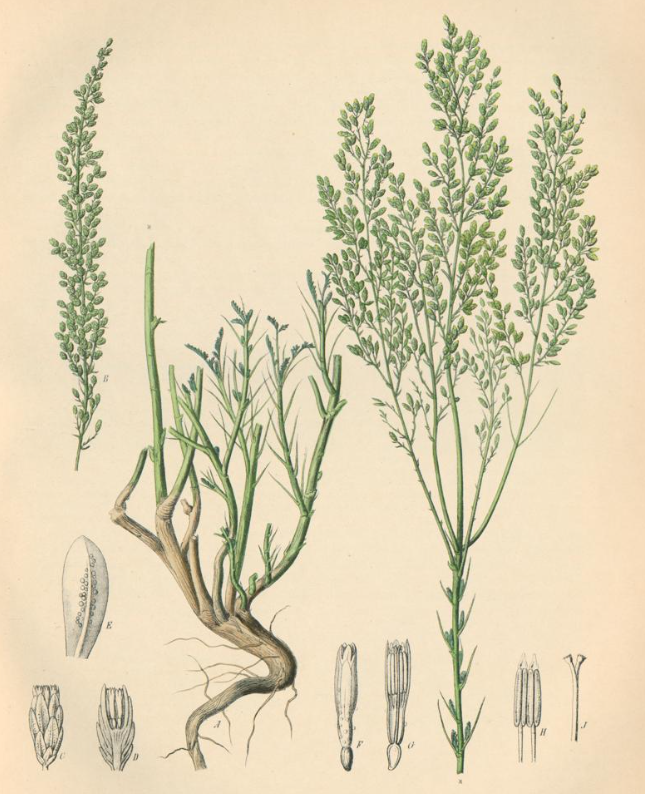Sentry Page Protection
Ortus Sanitatis, Meydenbach, 1491
Wormwood (left), Pontiac Wormwood (Right)
Common Wormwood Mountain or Roman Wormwood Pontic Wormwood of Galen
Eicones plantarum seu stirpium, Jacobus Theodorus, 1590
Eicones plantarum seu stirpium, Jacobus Theodorus, 1590
Botanische wandplaten, 1904–1914
Koehler's Medizinal Pflanzen, 1887
A. absinthum A. maritima
Atlas der Officinellen Pflanzen, Berg & Schmidt, Leipzig, 1893
Atlas der Officinellen Pflanzen, Berg & Schmidt, Leipzig, 1893
Botanical name:
Artemisia absinthium
Pontic, Roman or Mountain Wormwood (A. pontica) was used similarly, and was often preferred for Liver disease;
Sea Wormwood (A. maritima) is also used similarly, but is weaker.
"According to Hunain, Wormwood is of many varieties". (Avicenna)
Parts used:
Herb; flowering tops
Temperature & Taste:
Warm, dry. Bitter, pungent
"It is bitter, astringent and pungent" ... "Hot in the First and Dry in the Second degree". (Avicenna)
Classification:
2A APERIENT MEDICINES. 2B ATTENUATERS. 2C INCIDERS. 2D ATTENUATERS OF CONGEALED BLOOD. 2F. PURIFYING.
2G. CLEANSING. 2Q. ANODYNE. 2S. STRENGTHENING
3B. FEBRIFUGE & ANTIPYRETIC. 3C. ALEXIPHARMICS. 3E. DIURETIC. 3G. EMMENAGOGUE
4b. OPTHALMICS. 4e. STOMACHIC. 4f. SPLENETIC. 4g. HEPATIC. 4i. UTERINE
TCM:
B. Clears Heat and Damp B. Clears Deficient Heat
Artemisia absinthium
Pontic, Roman or Mountain Wormwood (A. pontica) was used similarly, and was often preferred for Liver disease;
Sea Wormwood (A. maritima) is also used similarly, but is weaker.
"According to Hunain, Wormwood is of many varieties". (Avicenna)
Parts used:
Herb; flowering tops
Temperature & Taste:
Warm, dry. Bitter, pungent
"It is bitter, astringent and pungent" ... "Hot in the First and Dry in the Second degree". (Avicenna)
Classification:
2A APERIENT MEDICINES. 2B ATTENUATERS. 2C INCIDERS. 2D ATTENUATERS OF CONGEALED BLOOD. 2F. PURIFYING.
2G. CLEANSING. 2Q. ANODYNE. 2S. STRENGTHENING
3B. FEBRIFUGE & ANTIPYRETIC. 3C. ALEXIPHARMICS. 3E. DIURETIC. 3G. EMMENAGOGUE
4b. OPTHALMICS. 4e. STOMACHIC. 4f. SPLENETIC. 4g. HEPATIC. 4i. UTERINE
TCM:
B. Clears Heat and Damp B. Clears Deficient Heat
Uses:
1. Clears Heat and Damp, Opens Obstructions of the Liver:
-Liver or Spleen Obstruction; Jaundice, Hepatitis
-Gall Stones; Cholecystitis
-resolves Swelling and inflammations
-"useful for internal Hardness if applied as a plaster or taken orally". (Avicenna)
-Hepatoprotective (See Research below)
2. Strengthens the Stomach, Clears Heat and Damp:
-weakness of the Stomach, poor digestion, nausea, vomiting, seasickness
-acute and chronic Gastritis
-"It restores Appetite ... Its syrup strengthens the Stomach". (Avicenna)
-"It strengthens and Fortifies the Stomach, cleanseth and purgeth" (Salmon)
-Inflammatory Bowel Disease, Crohn's Disease (See Research below)
3. Clears Damp-Heat, Promotes Urine:
-acute Urinary Tract Infections; Edema
-decoction in Wine, ashes steeped in white wine or the Salt of Wormwood may be used
-Leukorrhea
-Arthritis (See Research below)
-Nephropathy (See Research below)
4. Clears Heat, Resists Poison:
-preservative in times of infection; used in Antidotes
-various types of Fever; especially Tertian Fever (West, Unani, Ayurveda)
-with vinegar for Toadstool and mushroom poisoning (Pliny, Avicenna)
-with wine for Hemlock poisoning and venomous Bites including Scorpion bite (Pliny)
-Anti-Bacterial, Anti-Malarial, Anti-Pyretic (See Research below)
5. Kills Worms:
-various Worms and Parasites (See Research below)
-Roundworm, Tapeworm and Threadworm (West, Unani)
-BHP says Ascaris and Enterobius are specific indications
-topically for Lice, Fleas and other parasites
6. Moves the Blood, Promotes Menstruation:
-Amenorrhea; Dysmenorrhea
-promotes Labor in long or difficult Labor (can be applied as a compress)
-it has been used for Threatened Miscarriage (not from deficiency)
-"It improves the Complexion". (Avicenna)
7. Benefits the Brain, Arouses the Spirit:
-Regarded as a Brain tonic and stimulant in mental weakness
-Unani regards it as an exhilarant
-regarded as strength-promoting in Ayurveda
-Neuroprotective; enhances Memory and Learning (See Research below)
8. Clears Heat, Stops Cough:
-occasionally for Cough, Chronic Cough
-Antitussive (See Research below)
9. Externally:
-washes, poultices, liniments for Sprains, Strains, Swellings, Bruises, Dislocations, Lumbago, Arthritic pain, Headache, Toothache etc.
-applied with Honey to bruises (Pliny)
-treats Boils, Acne, Carbuncles and Swellings
-Running Sores, liniment of Wormwood with Honey (Pliny)
-used for Prurigo and Itching
-"useful for Urticaria when applied after mixing it with the flour". (Avicenna)
-the ashes are a good application to dry and heal chronic Ulcers
-boiled in salt water and used as a wash for Gangrene
-Tumors, beat the fresh plant with wine, vinegar and salt and apply
-externally to the temples and soles of the feet to promote Sleep
-externally to open obstructions of the Liver, Spleen and Stomach, and to benefit the Stomach and Digestion.
-Sore Throat, Tonsillitis, as a gargle
-the fumes or oil put into the ear benefits the Hearing; also for Earache
-‘The ashes of it with Rose Ointment, maketh Black Hair’. (Pliny)
-ashes mixed with olive oil are applied to Baldness and Alopecia
-strong infusion is used as a wash for falling or thinning hair, baldness;
-the ashes rubbed on with Olive or Almond oil also heals baldness (Avicenna)
-the infused oil helps growth of the beard (Avicenna)
-used to remove darkness under the eyes (Avicenna)
-in pessaries to promote Menstruation (Pliny)
-Sciatica, as a plaster with Figs (Pliny)
-preserves cloth from moths and insects
Dose:
In Wine to move the Blood, open obstructions and promote Urine.
Infused in Vinegar for Poison, Mushroom poisoning and against Epidemics.
Taken with Salt and Honey as a purgative.
In Infusion or Brief Decoction: 2–5 grams (up to 9 grams for Jaundice and severe obstruction);
In Powder: 250mg–3 grams (up to 6 or 9 grams of the powder has been used). For Fever, 2 drams doses were given.
Of the Juice: 2 drams–half ounce (5–15 mls)
Substitute:
1. Artemisia maritima
2. Southernwood (Unani)
3. Valeriana harwicki (Unani)
4. Teucrium polium
5. Agrimony and Gentian have also been used
6. Asarum (Unani)
7. Germander (Avicenna)
8. Half weight of Yellow Myrobalan
9. to strengthen the Stomach, same weight of Indian Valerian with half the amount of Chebulic Myrobalan (Avicenna)
10. Red (Armenian) Earth (Avicenna)
Correctives:
1. Pomegranate fruit or juice
2. Aniseed
3. Mastic
4. Water Lily
5. Honey
Preparation:
1. Dehydrated Juice or Juice Extract:
Traditionally, Wormwood was beaten, the jucie was extracted, then gently dried to the thickness of Honey. Or else, the herb was decocted to one-third, strained, then the decoction slowly boiled down to the thickness of Honey. (Galen)
In Wine to move the Blood, open obstructions and promote Urine.
Infused in Vinegar for Poison, Mushroom poisoning and against Epidemics.
Taken with Salt and Honey as a purgative.
In Infusion or Brief Decoction: 2–5 grams (up to 9 grams for Jaundice and severe obstruction);
In Powder: 250mg–3 grams (up to 6 or 9 grams of the powder has been used). For Fever, 2 drams doses were given.
Of the Juice: 2 drams–half ounce (5–15 mls)
Substitute:
1. Artemisia maritima
2. Southernwood (Unani)
3. Valeriana harwicki (Unani)
4. Teucrium polium
5. Agrimony and Gentian have also been used
6. Asarum (Unani)
7. Germander (Avicenna)
8. Half weight of Yellow Myrobalan
9. to strengthen the Stomach, same weight of Indian Valerian with half the amount of Chebulic Myrobalan (Avicenna)
10. Red (Armenian) Earth (Avicenna)
Correctives:
1. Pomegranate fruit or juice
2. Aniseed
3. Mastic
4. Water Lily
5. Honey
Preparation:
1. Dehydrated Juice or Juice Extract:
Traditionally, Wormwood was beaten, the jucie was extracted, then gently dried to the thickness of Honey. Or else, the herb was decocted to one-third, strained, then the decoction slowly boiled down to the thickness of Honey. (Galen)
Main Combinations:
Dodder & Wormwood
Wormwood & Aniseed
Wormwood is often combined with Aniseed to correct it and make it more pleasant to take. This was the original Spirit of Wormwood which was the forerunner to Absinthe. Used for obstruction of the Stomach, Liver and Spleen, for Worms, Jaundice and to benefit Eyesight.
Liver, Gall Bladder:
1. To Open obstructions of the Liver, Spleen and Stomach:
i. decoction of Wormwood in water (Herbarium Horstianum, 1630)
ii. Liver obstruction, Wormwood with Roman (or Indian) Spikenard (as in Electuary of Roman Spikenard)
iii. Spleen obstruction, Wormwood with vinegar or Figs (Pliny)
iv. Wormwood with Celery seed, Bitter Almond, Aniseed, equal parts (Pastillus Amarus of Nicholas)
v. Wormwood, Asarum, Parsley seed, Aniseed, Bitter Almond (Syrian 'Book of Medicine', Budge, 1913)
vi. Wormwood, Rhubarb, Costus, Rue, Mastic, Pepper, Raisins (Syrian 'Book of Medicine', Budge, 1913)
vii. Wormwood with Rose, Aniseed, Agrimony, Rhubarb, Bitter Almond, Mastic (as in Troches of Wormwood)
viii. Wormwood, Gentian, Asarum, Costus, Agrimony, Madder, Rue, Mastic, Thyme, Fenugreek, Raisins (Syrian 'Book of Medicine', Budge, 1913)
ix. Wormwood with Aloe, Aniseed, Agrimony, Bitter Almond, Celery seed, Asarum, Mastic, Spikenard (as in Troches of Aniseed)
x. Wormwood with Rose, Rhubarb, Tabasheer, Lacca, Agrimony, Sandalwood, Saffron (as in Pastillus ex Rhubarbi)
2. Jaundice:
i. Fresh Wormwood with Parsley or Maidenhair (Pliny)
ii. Wormwood, Bitter Almond, Aniseed, Spikenard (Pastillus ad Ictericos)
iii. Wormwood, Rosemary, Sloe (Prunus spinosa), Saffron (Pemell, 1652)
iv. Wormwood, Mugwort, Scolopendra (The Secrets of Alexis, 1615)
3. Gall stone, combine Wormwood with Peppermint and Camomile
4. Liver diseases:
i. Wormwood with Gentian, Amomum, Costus, Agrimony, Bitter Almond, Pepper, Aniseed (Hepatica Potio Mirabilis of Nicholas)
ii. Strengthen Liver, Cachexia, Edema, Jaundice, Wormwood with Liverwort, Chicory, Agrimony, Rose, Pimpernel root, Saffron, Sandalwood, Cinnamon (as in Species Hepatica)
5. Liver disease, Debility of Nature, chronic sickness, Wormwood with Sandalwood, Licorice, Rose, Spikenard, Mastic (as in Dianthu)
Stomach & Bowels
6. Stomach weakness
i. Wormwood with Rue, Pepper and Salt (Pliny)
ii. Wormwood with Calamus
iii. Wormwood with Aloe, Mastic (a version of Stomach Pills)
iv. in cold and damp cases, Wormwood with fresh Ginger and Orange peel
v. Wormwood with Blessed Thistle, Centaury
vi. atony of the digestive organs with disordered digestion, Wormwood, Gentian, Calamus (Sobernheim, 1840)
7. Digestive tonic to be taken before meals, Wormwood with Aloeswood, Zedoary, Spikenard, Saffron, Cardamon, Ginger, Calamus, Mint, Aniseed, Mastic (1 part each), Rhubarb (24 parts), Aloe (48 parts) (as in Pills Before Meals)
8. Stomach pain:
i. Wormwwod with Indian Spikenard (Avicenna)
ii. Syrup of Wormwood, Syrup of Rose
9. Melancholy, Stomach coldness and windiness Wormwood with Fumitory, Raisins (Pemell, 1652)
10. Nausea, Vomiting:
i. Wormwood with Mint
ii. Wormwood with Rose, Mint, Clove, Nutmeg, Cumin mixed with bread and vinegar as a plaster over the Stomach. (Herbarium Horstianum, 1630)
11. Flatulence, burping, insomnia, Wormwood with Camomile, Rue, Marjoram, in herbal sachets, heated, and placed on the Stomach (Wittich)
12. Inflammatory Bowel disease, Crohn's disease, Wormwood, Agrimony, Camomile, Tormentil
Inflammation, Tumors
13. For Fibroids, combine Wormwood with Oregano, Hyssop, St. Johns wort, Rue, Dodder, Pennyroyal, Fennel seed.
14. Inflammations, combine Wormwood with Balm, Peppermint, Oregano, Camomile, Lavender, Elder flowers (Resolvent Powder)
15. Hardness of the Liver, Jaundice, Bloating, Wormwood, Aniseed, Celery seed, Bitter Almond, Asarum (equal parts, as in Troches of Alexander)
16. Hardness of the Spleen, Wormwood with Oregano, Hyssop, St. Johns wort, Rue, Dodder, Pennyroyal (form a tincture with wine of Squill to be used externally)
Fever
17. Fever:
i. Wormwood with Camomile
ii. Chronic Fever, Wormwood with Agrimony (Avicenna)
iii. Chronic Fever combine Wormwood with Borage and Centaury
iv. Tertian Fever, Wormwood, Calamint, decocted in water (Herbarium Horstianum, 1630)
v. Malarial Fever, Wormwood juice ½ oz., Venice Theriac ½ dram
vi. Quartan Fever, Wormwood, Calamus (Herbarium Horstianum, 1630)
18. Shivering of a Fever, Wormwood and Camomile
Worms & Parasites:
19. Worms:
i. "Wormwood when cooked along with Lentil or rice and eaten, kills the worms". (Avicenna)
ii. Wormwood, Tansy, Feverfew
iii. Wormwood with Rue, Tansy, Senna and Licorice
iv. Wormwood with Tansy, Senna and Camomile (Meyer)
v. Wormwood with Horehound, Lupins equal parts, boil in wine, apply to navel (Botanicon Continens Herbarum, Dorsten, 1540)
vi. Worms with Cramps, Wormwood with Valerian and Orange peel
vii. Enema for Ascaris, Wormwood, Tansy, Rue (3 drams each), Water 12 oz., decoct to 8 oz., add Castor Oil ( oz.). (Sobernheim, 1840)
Other:
20. Cough: Wormwood, Bitter Almond, Myrrh, Aniseed, Fenugreek, Honey (as in Antidote for the Liver and Chronic Cough)
21. Vulnerary (for Wounds):
i. Wormwood, Lavender flowers, Peppermint leaves, Rosemary leaves, Rue leaves, Sage leaves (1 part each), Diluted spirit (20 parts), Water (50 parts). Leave to stand 48 hours, then distil off 40 parts. (Ergänzb)
ii. Wormwood, Hyssop, Yarrow, Thyme, Ground Ivy, Lemon Balm, Sage, Coltsfoot, Arnica flower, equal parts (Swiss Tea)
22. To cleanse the chest, Wormwood with Orris (Pliny)
23. To promote Menstruation:
i. Wormwood with Pennyroyal
ii. Wormwood with Mugwort, Myrrh, made into a pessary with honey (Botanicon Continens Herbarum, Dorsten, 1540)
24. Suppressed Menstruation:
i. Wormwood with Cinnamon, Myrrh, Savin, Spikenard, Rhubarb, Saffron, Madder, Rue, Pennyroyal, Balm (as in Tincture for Suppressed Menstruation)
25. Chlorosis, Wormwood with Blessed Thistle, Balm, St. John's wort, Black Hellebore prepared, Galangal, Myrrh (as in Tincture for Chlorosis)
26. Chronic Skin diseases, Wormwood with Dodder, Violet, Yellow Myrobalan decoted and made into a syrup with Fumitory juice and Sugar (Syrup of Fumitory Minor of Mesue)
27. Edema:
i. Conserve of Wormwood, half ounce (Herbarium Horstianum, 1630)
ii. Wormwood with Juniper (Weikard)
iii. Wormwood with Parsley seed, Fennel seed, Nettle
iv. to purge water, Wormwood with Blessed Thistle, Agrimony, Vervain, Fennel root, Parsley root, Asarum (Pemell, 1652)
v. Wormwood with Spikenard, Celery seed, Parsley seed with Troches of Rhubarb (Rondeletus)
28. Urinating Blood:
i. with Purulent matter, Wormwood with Poppy seed, Celery seed, Pine nut, Almonds, Winter Cherry, Frankincense, Tragacanth (as in Troches of Winter Cherry from Dispensatory of Ibn at Tilmid)
ii. Wormwood, Red Earth, Amber, Gum Arabic, Pomegranate flower, Henbane seed (Troches for Urinating Blood from Dispensatory of Ibn at Tilmid)
29. Ascites:
i. Wormwood with Fumitory, Agrimony, Spikenard, Yellow Myrobalan, Rhubarb (as in Potion for Ascites)
30. Clarify the Sight, Wormwood with Celandine, Violet, Eyebright, Triphala, Aloe (as in Pills to Clarify)
Externally:
31. Toothache, decoct Wormwood with Vervain and drink, apply the herbs as a fomentation over the jaw. (Hildegard)
32. Sprains and Strains, powder Wormwood, mix with egg white and bind on. (Wirtzung)
33. Bruising, Wormwood, Comfrey, Camomile, Saffron, Fenugreek meal, Butter
34. Headache:
i. throbbing, boil Wormwood in water and bind to the temples (The Secrets of Alexis, 1615)
ii. Wormwood, Camomile, Betony, Vervain, Marjoram, Rose, Stoechas, Rosemary. Beat and sew into a cap to be worn on the head.
35. Fomentation for Contusions, Dislocations, and local debility: Wormwood, Bay leaf, Rosemary (2 oz. each), Water (10 pounds). Boil down to 8 pounds after straining. (Pharmacopoeia medici practici universalis, Bruxelles, 1817)
36. Fractures, Wormwood, Tag Alder, White Chicken Dung; decoct them together, add Hog fat and simmer to an ointment (Madame Young's Guide to Health, 1858)
37. Erysipelas, Wormwood (4 parts), Chalk powder (8 parts), Armenian Earth (2 parts), form a dusting powder. (Dispensarium Lippiacum, 1792)
38. Gangrene, Wormwood with Willow bark, Rue, Sage, St. John's wort, Myrrh, Asafetida, Aloe (topically)
39. Aromatic Bag for the Stomach:
i. Cinnamon, Nutmeg (½ oz. each), Mace, Clove (2 drams each), Spearmint (2 handfuls), Wormwood (½ handful). Sew into a bag; to use, warm it in a pan, sprinkle with a little wine and apply to the stomach to warm the Stomach and promote Appetite and Digestion. (Fuller)
ii. with Mint, Thyme, Rose, Angelica, Caraway seed, Nutmeg; beat, put into a bag and dip in hot wine and apply. (Fuller)
40. Poor Hearing, Tinnitus: Wormwood, Rue, Camomile, Juniper, boil in 3 parts water and 1 part vinegar and allow the fumes to enter the ear.
41. Sciatica, Wormwood, Southernwood, Mugwort (as a fomentation)
42. Cystitis, Wormwood, Camomile, Hops (as a fomentation)
Major Formulas:
Infusion for Jaundice (Riverius)
Decoction for the Gall Bladder
Decoction for the Gall Bladder (2)
Decoction Against Vomiting
Decoction to Promote Appetite
Decoction for Boils and Abscess
Opening Hepatic Decoction
Decoction for Chronic Heat-type Headache (Mesue)
Decoction of Fumitory Compound
Decoction of Thyme
Aromatic Bitter Decoction
Syrup of Wormwood
Syrup of Fumitory Lesser (Mesue)
Syrup of Fumitory Compound (Augustana)
Four Thieves Vinegar
Powder to Warm the Belly (Rondeletius)
Powder to Warm and Bind the Belly (Roneletius)
Powder to Purge in Ascites (Nicholas)
Powder of Musk Bitter (Diamoschu Amarum) (Mesue)
Powder for the Liver
Powder for the Liver (Bononiense)
Troches for the Liver and Jaundice (Nicholas)
Troches of Agrimony
Troches of Rose (Rhasis)
Troches of Rhubarb Greater
Troches of Wormwood Greater (Mesue)
Troches of Wormwood Lesser (Mesue)
Troches of Wormwood Greater
Bitter Troches (Nicholas)
Pills for Cataracts
Antidote for Edema (Nicholas)
Electuarium Dianthu (Galen)
Pills of Agrimony Greater (Mesue)
Pills of Rhubarb (Mesue)
Green Oil
Cautions:
1. Not used during pregnancy.
2. Avoid overdose or long-term usage.
3. Pliny said it must never be administered in Fevers. It has been much used for Fever, especially Malarial Fevers.
Toxicity:
–LD50 > 2,000 mg/kg body weight (see here)
–Thirteen-week repeated dose toxicity study of wormwood (Artemisia absinthium) extract in rats.
Side Effects:
1. Persistent metabolic acidosis and severe diarrhoea due to Artemisia absinthium poisoning.
2. Gastrointestinal bleeding secondary to interaction of Artemisia absinthium with warfarin.
Main Preparations used:
Distilled water, Spirit, dehydrated Juice, Wine, Extract, Conserve, Syrup, Troches (compound), Oils both infused and Distilled, a Fixed and a Volatile Salt
1. Not used during pregnancy.
2. Avoid overdose or long-term usage.
3. Pliny said it must never be administered in Fevers. It has been much used for Fever, especially Malarial Fevers.
Toxicity:
–LD50 > 2,000 mg/kg body weight (see here)
–Thirteen-week repeated dose toxicity study of wormwood (Artemisia absinthium) extract in rats.
Side Effects:
1. Persistent metabolic acidosis and severe diarrhoea due to Artemisia absinthium poisoning.
2. Gastrointestinal bleeding secondary to interaction of Artemisia absinthium with warfarin.
Main Preparations used:
Distilled water, Spirit, dehydrated Juice, Wine, Extract, Conserve, Syrup, Troches (compound), Oils both infused and Distilled, a Fixed and a Volatile Salt
Click the Tabs above for more information on this Medicine
Pliny on Wormwood:
|
'There are numerous kinds of absinthium; the Santonic, for instance, so called from a city in Gaul, and the Pontic, which comes from Pontus, where the cattle are fattened upon it— a diet which causes them to be destitute of gall [Bile]. The Pontic Wormwood, we may remark, is of the finest quality, superior to that of Italy, and much more bitter; the pith, however, of the Pontic wormwood is sweet. As to its general utility, a plant so commonly found and applied to such numerous uses, people are universally agreed; but with the Romans more particularly it has been always held in the highest esteem, from the fact of its being employed in their religious ceremonials. Thus, for instance, upon the Latin Festival, it is the custom to have a race of four-horsed chariots in the Capital, and for the conqueror to be presented with a draught of wormwood; from the circumstance, no doubt, that our forefathers were of opinion that good health was the most valuable reward they could bestow upon his skill.
'This plant is very strengthening to the stomach, and hence it is that wines are flavoured with it, as already stated. A decoction of it in water is also taken, the following being the method employed in preparing it. Six drachmae of the leaves are boiled, with the branches, in three sextarii of rain water, and the preparation is then left to cool in the open air a day and a night. Salt, too, should be added to it. When old, it is utterly useless. A dilution of wormwood steeped in water is also used, such being the name given to this method of preparing it. This dilution is made by leaving the vessel covered up for three days, any kind of water being used. 'Pounded wormwood is but rarely employed, and the same with the extracted juice of the seed. In cases, however, where it is extracted, the seed is subjected to pressure as soon as it begins to swell, after which it is soaked for three days in water, if used fresh, and seven, if dry. It is then boiled in a copper vessel, in the proportion of ten heminae to forty-five sextarii of water, after which it is strained off and boiled gently to the consistency of honey, in the same way as the juice is extracted from the smaller centaury. The juice, however, of wormwood, thus extracted, is bad for the head and stomach; whereas the decoction, on the other hand, is wholesome in the highest degree, as it acts astringently upon the stomach, carries off bile, is a powerful diuretic, has a soothing effect upon the bowels, and assuages pains in the intestines. With the addition of sile, Gallic nard, and a little vinegar, it dispels nausea and flatulency, and expels intestinal worms. It removes qualmishness, promotes the digestion, and, with the addition of rue, pepper, and salt, disperses crudities of the stomach. |
'The, ancients were in the habit of giving wormwood
as a purgative, the dose being six drachmae of the seed with three of salt and one cyathus of honey, in one sextarius of sea water kept for some time. This preparation, however, is rendered more efficacious by doubling the proportion of salt; the seed, too, must be bruised with the greatest care, as there is con siderable difficulty in pounding it. Some authorities have prescribed the dose above mentioned to be given in polenta, with the addition of pennyroyal; while others recommend the leaves to be given to children in a dried fig, to disguise their bitterness. Taken with iris, wormwood acts as a detergent upon the thoracic organs: for jaundice it is used raw, with parsley or adiantum. In cases of flatulency, it is sipped every now and then, wanned in water; for liver complaints it is taken with Gallic nard [Valeriana italica], and for diseases of the spleen, with vinegar, pap, or figs. Taken in vinegar it neutralizes the bad effects of fungi and of viscus: in wine it is an antidote to the poison of hemlock, and to the bite of the shrew-mouse, and is curative of wounds inflicted by the sea-dragon and the scorpion. It contributes also very greatly to the improvement of the sight, and is used as an external application, with raisin wine, for deflations of the eyes, and with honey, for bruises. 'The steam of a decoction of wormwood is curative of affections of the ears; and when they are attacked with running sores, a liniment of wormwood bruised with honey is applied. Three or four sprigs of wormwood, with one root of Gallic nard, taken in six cyathi of water, act as a diuretic and as an emmenagogue; indeed, if taken with honey, or employed as a pessary with wool, it has especial virtues as an emmenagogue. In combination with honey and. nitre it is useful for quincy, and an infusion of it in water is good for epinyctis. A topical application is made of it for recent wounds, provided always they have not been touched with water: it is employed also for ulcers upon the head. In combination with Cyprian wax or figs, it is highly recommended as a plaster for the iliac regions: it is curative also of prurigo, but it must never be administered in fevers. Taken in drink, it is a preventive of sea sickness; and, worn attached to the body, beneath an apron, it arrests inguinal swellings. The smellof it induces sleep, a similar effect being produced by placing it under the pillow unknown to the party. Kept among clothes it preserves them from worms, and used as a liniment, with oil, or burnt as a fumigation, it has the effect of driving away gnats. Writing ink, mixed with an infusion of wormwood, effectually protects the writings from the attacks of mice. Ashes of wormwood, mixed with rose unguent, stain the hair black.' (The Natural History of Pliny, trans. by Bostock and Riley, Vol. 5, 1856) |
Last Updated 02/24



